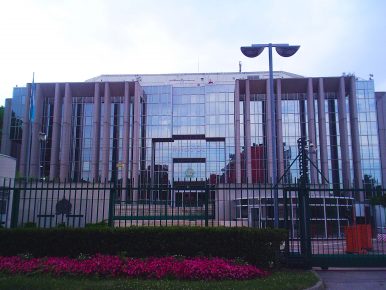By Rob Edens
As the Hong Kong protests continue this summer, they have now clearly morphed into an expression of wider, deep-seated discontent about Beijing’s seemingly unstoppable encroachment on the former British territory. The authorities have geared up in anticipation of escalating violence, sparked by a controversial extradition bill that would have opened an avenue for detainees to be sent across the border into China’s opaque and politicized legal system. Though now shelved, the extradition bill offers a picture-perfect representation of Beijing’s approach to dealing with dissidents.
The Chinese government relies on legal institutions to not only enforce its version of the “rule by law,” but also to legitimize otherwise arbitrary and legally dubious measures. In a press conference on Hong Kong, Chinese authorities made Beijing’s red line clear: “unlawful acts are unlawful.” But well beyond Hong Kong’s borders, China has made prolific use of institutions like Interpol – meant to facilitate international policing cooperation and bring fugitives to justice – to instead track down and punish those who have fallen afoul of Chinese President Xi Jinping.
China’s Extended Global Reach
For Beijing, Interpol’s system is of interest for both the high degree of legitimacy it bestows onto its pursuits, but also for its convenience. China has blatantly manipulated the Interpol system for years with the intent to hunt down dissidents and exiles around the globe, effectively weaponizing Interpol. This has forced the organization to re-examine tens of thousands of wanted person notices, primarily to gauge whether they are politically motivated. Human rights groups have repeatedly charged the international police organization with being complicit in state-sponsored campaigns to nab dissidents. The results are a corrupted system, abused for political ends.
Since 2012, when Xi came to power and voiced his ambition to root out corruption wherever it may rear its head, Interpol has annually issued some 200 Beijing-requested international arrest warrants known as “red notices.” The most prominent case has been that of tycoon Guo Wengui, also known as Miles Kwok, who is wanted by Beijing on corruption charges – charges Guo denies. In 2017, Interpol issued a red notice seeking his arrest, but the case has been on the periphery of media attention since.
Based in the United States, Guo became a prolific interviewee with overseas media at the same time that Beijing set its sights on his return. Guo says he met with officials from China’s immensely powerful graft-busting Central Commission for Discipline Inspection to discuss the details of his case, and claims the true details of the allegations waiting for him in a Chinese court differ from the allegations of the red notice. A highly anticipated live interview with Voice of America was cut halfway through with no explanation, raising questions whether China had put pressure on VOA to do so.
Sadly, authoritarian governments like China are not the only ones to misuse tools meant to preserve the international rule of law. Even in Washington, the Magnitsky Act – one of America’s primary tools for protecting human rights and punishing violators around the globe – is already being abused for political ends.
Losing the Moral High Ground
Over the past several weeks, for example, a few members of Congress have started to push the Trump administration to apply the law against the government of Kuwait, a close U.S. ally, over the detention of Russian citizen Marsha Lazareva. Lazareva, a business executive at the Kuwait-based equity firm KGL Investment (KGLI), stands accused of embezzlement and money laundering. Her firm is affiliated with a major U.S. government contractor, Kuwait & Gulf Link (KGL), which has itself previously been accused of fraud, embezzlement, and sanctions busting. If these congressional representatives are successful, it would mean the imposition of sanctions on a number of Kuwaiti officials in relation to Lazareva’s long-running embezzlement case.
By comparison, the last time the Global Magnitsky Act was applied to Middle Easterners, it was over the suspected murder of journalist and political commentary Jamal Khashoggi by agents of the Saudi government.
This congressional effort is not occurring in a vacuum. A high-powered and well-funded public relations campaign attacking the charges raised in Lazareva’s trial has brought together a coalition of prominent Americans to lobby for her release. Including the likes of Neil Bush and former FBI director Louis Freeh, the group claims Lazareva has been deprived of her human rights in Kuwait. As Talking Points Memo has reported, media coverage potentially linked to the campaign has targeted outlets like the Daily Caller, known to enjoy readership in the Oval Office.
If Trump’s past behavior is a guide, his administration may well fall for this strategy. He has often been quick to defend those suspected of serious crimes when politically expedient, undercutting America’s ability to stand up to other violators of global legal norms – like China and Russia – in the process. In the wake of Khashoggi’s murder, the U.S. State Department said it was studying the “applicability of the global Magnitsky sanctions” on the assets of Saudi intelligence and foreign ministry officials. While the Act was eventually applied – if reluctantly – not even the gruesome nature of Khashoggi’s alleged murder in the Saudi consulate in Istanbul was able to deter Trump from forcing through a controversial arms deal with Riyadh.
President Trump’s reluctance to uphold basic global norms is not just a tragedy for America’s moral compass. Given that the Magnitsky Act was designed specifically to help the U.S. government act in response to human rights crisis like the ongoing repression of the Uyghur community in China, its rapid politicization shows just how much America’s international credibility on human rights has atrophied in a short span of time.
That, in turn, has left an institution like Interpol with no real counterweight to turn to when governments like China seek to manipulate its tools for their own ends.
Rob Edens is a London based researcher on Asian affairs and contributor to The Diplomat, The Straits Times, and EuObserver.

No comments:
Post a Comment